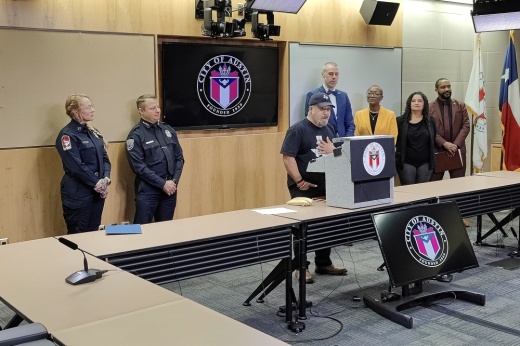The big picture
The Downtown Austin Community Court, or DACC, is intended to provide an alternative pathway through criminal justice proceedings for the homeless community. The DACC manages a community service program for requirements tied to misdemeanor offenses; a storage service for unhoused clients; and homeless assistance like case management and help with housing and health care.
While traditionally limited to Austin's core, the DACC's services have now expanded to cover more of the city. It also recently launched a Mobile Court program to get resources and information to people living across the community.
This fall, City Council formally accepted $1.45 million in federal funds that will build out the mobile court's capacity and support its work for the next several years.
“Together, these grants will enable the DACC’s ability to strengthen its innovative and community-focused approach to providing services by removing barriers, meeting people where they are and connecting them to critical resources like mental health care and substance use services," said council member Natasha Harper-Madison, who sponsored funding for the mobile court in this year's city budget.
The details
The grants, provided through the Department of Justice's National Community Courts Initiative, include:
- $900,000 for Mobile Court service expansion related to substance use services
- $550,000 for training and partnerships between the Mobile Court and other community organizations to improve case management
Put in perspective
Alfredo Reyes, Jr., an organizer with the homelessness, drug and criminal justice policy advocacy group VOCAL-TX, credited the Mobile Court for getting him connected with resources while homeless. He also said he's been incarcerated and struggled with substance use, challenges that the DACC is able to respond to.
“Being homeless leads to more policing and arrests out on the streets, and it’s hard to find the help you need especially when you’re unhoused," he said. "Being worried about criminal backgrounds, outstanding warrants or getting ticketed is keeping many people from accessing the services we need. Not only that, people have many problems at once and it is overwhelming and confusing to navigate the system and get the help you need.”
The DACC also interacts with health care organizations like Integral Care and Austin/Travis County Emergency Medical Services, which offers assistance for homelessness through initiatives like its Pop-up Resource Clinic program.
EMS Chief Robert Luckritz said paramedics have a close relationship with the court over care for vulnerable residents, and that DACC program improvements help ease barriers to medical services and can lead to better patient outcomes.
“So many individuals that we serve on a day-to-day basis are stuck in a cycle. They are stuck in a cycle of overutilization of the 911 system and the health care system, among others," Luckritz said. "What we’ve realized is that in order to break that cycle, we have to focus on these partnerships. We have to focus on the social determinants of health, and we can’t do that alone as an EMS department.”





